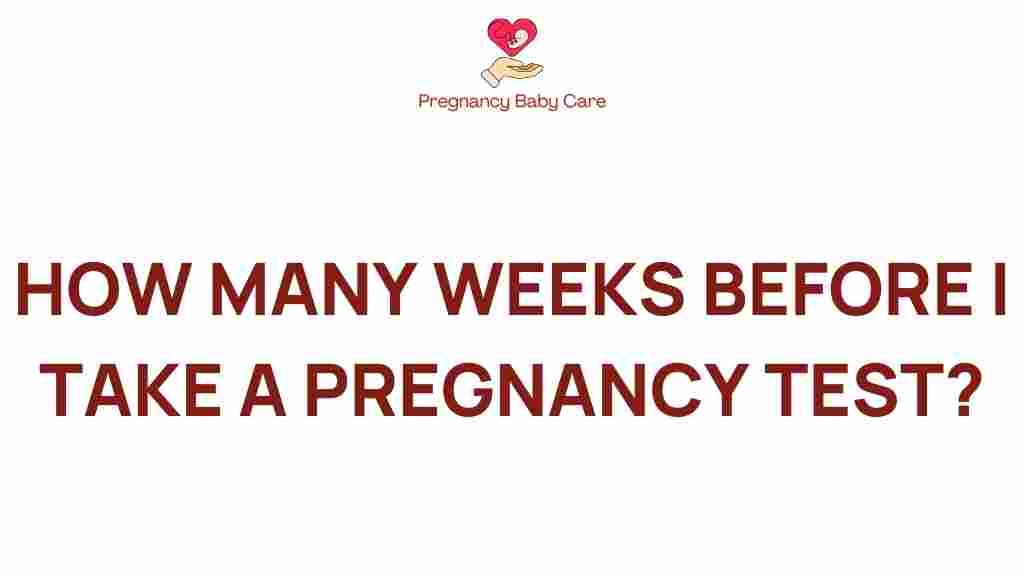The Countdown: When Is the Right Time for a Pregnancy Test?
Deciding when to take a pregnancy test can be a daunting task for many individuals and couples trying to conceive. With so much information available, it’s crucial to understand the best timing to ensure accurate results. In this article, we will explore the early signs of pregnancy, how your menstrual cycle relates to ovulation and conception, and the factors that affect the testing accuracy of home tests. By the end, you will have a clear understanding of when to test and what to expect.
Understanding Your Menstrual Cycle
Your menstrual cycle is the foundation for determining when to test for pregnancy. Typically, a cycle lasts about 28 days, but it can range from 21 to 35 days in adults. Here’s a brief overview of the phases of your cycle:
- Menstrual Phase: Days 1-5, when bleeding occurs.
- Follicular Phase: Days 1-13, where the body prepares for ovulation.
- Ovulation: Around day 14, when an egg is released.
- Luteal Phase: Days 15-28, when the body prepares for a potential pregnancy.
Knowing the length of your cycle helps in pinpointing ovulation and understanding when to test for pregnancy.
When to Test: Timing is Everything
So, when should you take a pregnancy test? The answer largely depends on your cycle and when you believe conception may have occurred. Here’s a step-by-step guide:
1. Track Your Ovulation
To determine when to test, first, you need to know your ovulation schedule. Ovulation generally occurs about 14 days before your next period. If you have a regular 28-day cycle, you likely ovulate around day 14. If your cycle is irregular, consider using ovulation prediction kits or tracking basal body temperature to identify your ovulation window.
2. Wait for a Missed Period
The most reliable time to take a pregnancy test is after you have missed your period. Most home tests are designed to detect the hormone hCG (human chorionic gonadotropin), which is produced after fertilization. Here’s a general guideline:
- For Regular Cycles: Test at least one week after your missed period.
- For Irregular Cycles: Test at least 14 days after suspected ovulation.
3. Early Testing
If you are eager to know, some home tests claim to detect pregnancy a few days before your missed period. However, testing too early can lead to false negatives. For the most accurate results, it’s advisable to wait until after your missed period.
Identifying Early Signs of Pregnancy
Before taking a pregnancy test, be on the lookout for early signs of pregnancy. While these symptoms can vary, common indicators include:
- Missed Period: The most obvious sign.
- Nausea: Often referred to as morning sickness.
- Breast Changes: Tenderness, swelling, or darkening of the areolas.
- Fatigue: Increased tiredness or exhaustion.
- Frequent Urination: A common symptom in early pregnancy.
While these signs can indicate pregnancy, they can also be caused by other factors, so taking a pregnancy test is essential for confirmation.
Understanding Testing Accuracy
Testing accuracy can vary based on several factors:
- Test Sensitivity: Some tests can detect lower levels of hCG and may provide earlier results.
- Proper Use: Follow the instructions carefully for the most accurate results.
- Timing: Testing too early can lead to false negatives.
If you receive a negative result but still suspect pregnancy, wait a few days and test again. If you continue to receive negative results but miss your period, consult a healthcare provider.
Troubleshooting Testing Issues
Sometimes, you may encounter issues when taking a pregnancy test. Here are some common troubleshooting tips:
- Expired Tests: Always check the expiration date on the box.
- Incorrect Usage: Make sure to follow the instructions provided with the test.
- Timing of Test: Testing too early can produce inaccurate results.
- Diluted Urine: Testing after drinking a lot of fluids may dilute your urine, affecting accuracy.
Conclusion: Timing Your Pregnancy Test
Knowing when to test for pregnancy is crucial for getting accurate results and minimizing stress. Understanding your menstrual cycle, recognizing early signs of pregnancy, and being aware of the factors that affect testing accuracy can help you navigate this important moment in your life. Remember, if you have any doubts or concerns about your results, don’t hesitate to reach out to a healthcare professional for guidance.
For more information on pregnancy and related topics, check out this resource.
If you’re looking for more tips on fertility and pregnancy planning, visit our blog for the latest updates and expert advice.
This article is in the category Pregnancy and created by PregnancyBabyCare Team
